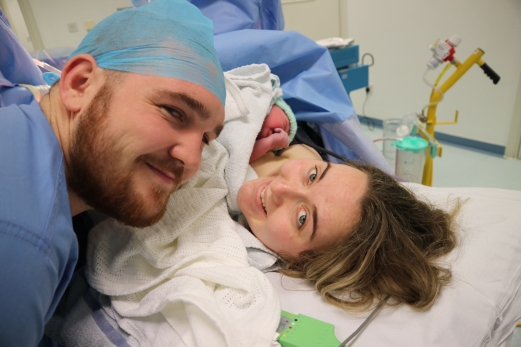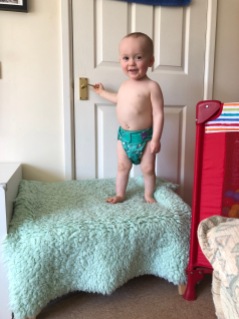As mental health awareness week comes to a close, I’ve decided to share this rather personal post with you. I’ve always felt rather alone when it came to understanding and talking about my own mental health but with all the media attention surrounding it of late, it still stands that there can never be enough done to highlight the importance of mental health and well-being. Sharing our experiences in the hope of helping others has become a blooming good start.
Having toyed with the idea of sharing this with you all, I once again find myself thinking that if one person reads this and it helps just one person, then it was worth the vulnerability and honesty of sharing my personal journey. I’ve discussed mental health before; wrote myself a letter in March about things I wish I’d known, things I would tell myself, but I always find that no matter what I would tell myself, I come back to my fears and the anxiety-inducing moments that surround the trauma of childbirth which can creep into the corner of even my sunniest days. When the smallest of thing that can set off a wave of panic, sometimes it’s unavoidable to suppress.

Newly Dazed
24 hours a day, 7 days a week, 365 days a year; Motherhood in unapologetically all-consuming but motherhood with mental health challenges is nothing like I expected. After writing our birth story last May and writing a letter last March, I’m now revisiting that day with a different set of eyes whilst looking at the journey that got me here today. As I’ve watched our little man start to grow up, my body and mind have changed. Regularly asked about the possibility of ‘Baby Number Two’, there are countless things I need to face and accept before that thought even enters my anxious brain. Looking back at my last month of pregnancy and Rory’s birth, I’ve struggled to accept the way things panned out.
My pregnancy with Rory wasn’t anything out of the ‘ordinary’. In fact, if you have read any of my previous blogs, I’d say I was rather lucky. I discussed my fortune in having no morning sickness or having any other debilitating symptoms or side effects. This lasted right up until I left work on maternity leave. That week magically flicked a switch and changed everything: I developed PUPPP. Pruritic Urticarial Papules and Plaques of Pregnancy is a nasty condition that develops in late pregnancy (and apparently more common in women having baby boys) and left my skin searing. I was itching with blisters and hives all over and burned at every hour of the day and night. Sleep was a thing of the past and doctors’ appointments became every other day, being tested over and over for Obstetric Cholestasis (a liver condition that can sometimes require induction) which luckily always returned negative results. I was exhausted and getting nervous at this point, I entered my final week of pregnancy feeling and thought was prepared. Still walking a mile or so in the afternoons hoping to induce early labour, I was offered a sweep – I need not go into details but DO NOT DO IT… I’m only joking but, in all seriousness, if ever in a position where this is offered: enter this with caution as at the very least it insanely uncomfortable and incredibly invasive. It was just 3 days later that I went into labour and 5 days later that I had an emergency c-section: the scariest eventuality that I was unprepared for. Leaving me swollen, cut and stitched, in agony and barely mobile, I felt couldn’t help but feel traumatised. How on Earth do you prepare for that!? Unwilling to talk about the event in depth or great detail, it became easy to brush the emotional side under the carpet and focus on my physical recovery which became unbearably tough on its own. It took me a good 5 months to realise how I truly felt about Rory’s birth.
Whilst speaking with a health visitor and NHS maternity service worker just last week, I found myself still feeling overpoweringly conscious of what I had been through. Without a doubt, I always find myself referring to how much worse it could have been or how there are women every day who face far worse but for me but I can’t help but linger on the single thing haunting what should be one of my happiest memories: it is the pure fact I was astronomically unprepared for a birth like that. My mind forever replays a scene from one of my favourite films, ‘About Time‘, during these moments. In a scene involving an accident that the main character Tim tries to change, he narrates a quote from a song by Baz Luhrmann called ‘Sunscreen‘: ‘He says worrying about the future is as effective as trying to solve an algebra equation by chewing bubble gum. The real troubles in your life will always be things that never crossed your worried mind’ …No matter how hard I try, I’m still the one starring at the equation chewing that gum.
When I first opened up to a health visitor about how I felt, I was afraid what she would think of me. Mental health issues are associated with weakness but it takes incredible strength to face such inner battles. As I eased into talking about how I’d been feeling after surgery and how I’d coped with accepting the birth, PTSD was brought up. Always the person to think ‘but I haven’t been to war,’ or ‘I don’t live in a war zone‘, I needed to stop being so naive. PTSD isn’t because of a specific type of trauma and it can arrive and linger in many forms. It can be your memories keeping you awake in a cold sweat leaving you terrified to think too deep into what you’ve been through; It can be the very thought of how close to death you came and how it sends the blood rushing through your body, leaving you light headed and nauseous. It’s every time you see your scars, your stomach churns and the thought of how you wanted it to be makes you angry and somewhat irrational about the most basic of activities. It’s all consuming and something I’m now actively working to get through and I’m ok that it may take some time. Turns out the NHS have a fantastic service available where you can go and see specially trained midwives. They can talk you through what you’ve been through and help you process your feelings or fears surrounding your pregnancy, birth or motherhood. I’ll be taking part in a session in the next month and I’m both curious and anxious but hopeful it will help.

Walking has become the best way to clear my head
Another side of mental health I find challenging is handling my anxiety. As I’ve become less afraid to admit it, it’s become easier to recognise. Postpartum anxiety is something I’ve talked about, previously in the form of separation anxiety and just like most mental health matters, each can take many forms. For me, it’s been an unexplainable jealousy, an underlying bitterness and twisting in the gut. A strange paranoia and relentless envy. It’s restless nights, toxic social media scrolling, actively avoiding every mirror, shop or car window. It’s taking hours to get dressed, noticing every extra stretch mark, wrinkle, crease or fold. It’s nightmares of what could or could’ve happened, the unimaginable and unthinkable. It’s all-around emotion, tears and upset and it’s also easy to slip into covering it up and hiding it far too often. Once again, it has taken me a while to actively seek help. You don’t always recognise it and you don’t always want to speak to those closest to you or anyone at all then there’s the option of medical help. For me, when I’ve seen GP in the past I have always been handed a ‘self-referral’ leaflet. These are without a doubt the most disheartening handout of information to be given when you’re in a doctor’s office trying to explain yourself after it’s taken weeks or even months to get yourself that far. I’ve learned that the doctors were no help, but when I turned to the health visitors, they appeared to be angels in disguise pointing me towards the NHS service I talked about earlier. It’s little steps to help put the pieces back together, to adjust to a new normal and to accept what has happened and move forward.
Our Little Monkey
Becoming a mother can be the hardest but the most rewarding thing you might ever do but you’ll never be the only one doing it. Avoiding being swallowed up in mental health challenged always comes down to being honest with yourself. Even in your darkest hour, only you can start the process of recovery. No matter how many times you try to suppress or hide how you’re feeling or the way you’re thinking, it will only deteriorate. Take charge of your health – it may be completely out of your comfort zone but try your best to reach out, find local groups or speak to your local maternity services. Opening up can be one of the scariest things you can do and yes, it is sometimes so much easier to lie, to really hide how you feel but sharing your experience can kick-start a very important process that will, first of all, help you feel a damn site less alone. Please, if you’re feeling low, sad, feeling like you are struggling, find someone who can help you in whichever form works for you!
As my title ask ‘how can we talk about this’, I’ve come to think the answer is far simpler than we thought. I believe it lies in empowering one another to speak out, share experiences and challenges. It’s guiding each other through difficult times and becoming a support network. We as women, as friends, family, colleagues could and should be supporting each other whatever the cause or type of mental health issue it is. Support is priceless.
______________________________
I hope, if you’re looking for help and need assistance, the links below help point you in the right direction and help you start your journey
As always, thank you for reading
Loves to all,
OCM xoxo
- NHS Mental Health – https://www.nhs.uk/conditions/stress-anxiety-depression/
- Postpartum Mental Health – http://www.postpartum.net
- Post Partum Progress – http://www.postpartumprogress.com/the-symptoms-of-postpartum-depression-anxiety-in-plain-mama-english
- Birth Trauma Association – http://www.birthtraumaassociation.org.uk
- Postpartum Mental Health Support @ Mind – https://www.mind.org.uk/information-support/types-of-mental-health-problems/postnatal-depression-and-perinatal-mental-health/#.WwGGHWaZOqA
- PUPPP – https://www.whattoexpect.com/pregnancy/whose-body/skin-rashy.aspx
- Obstetric Cholestasis – https://www.rcog.org.uk/globalassets/documents/patients/patient-information-leaflets/pregnancy/pi-obstetric-cholestasis.pdf


